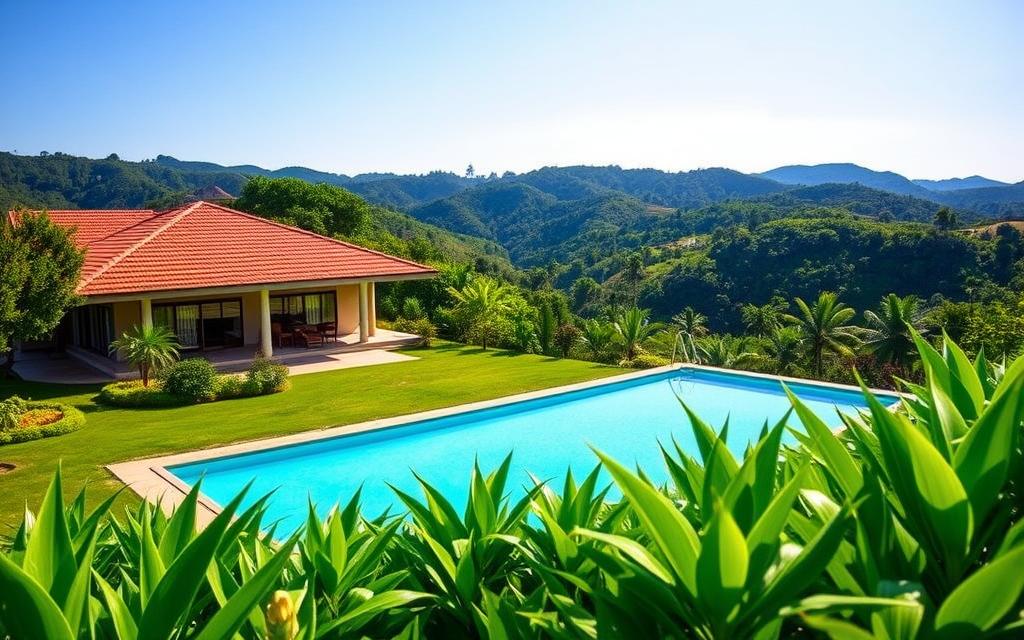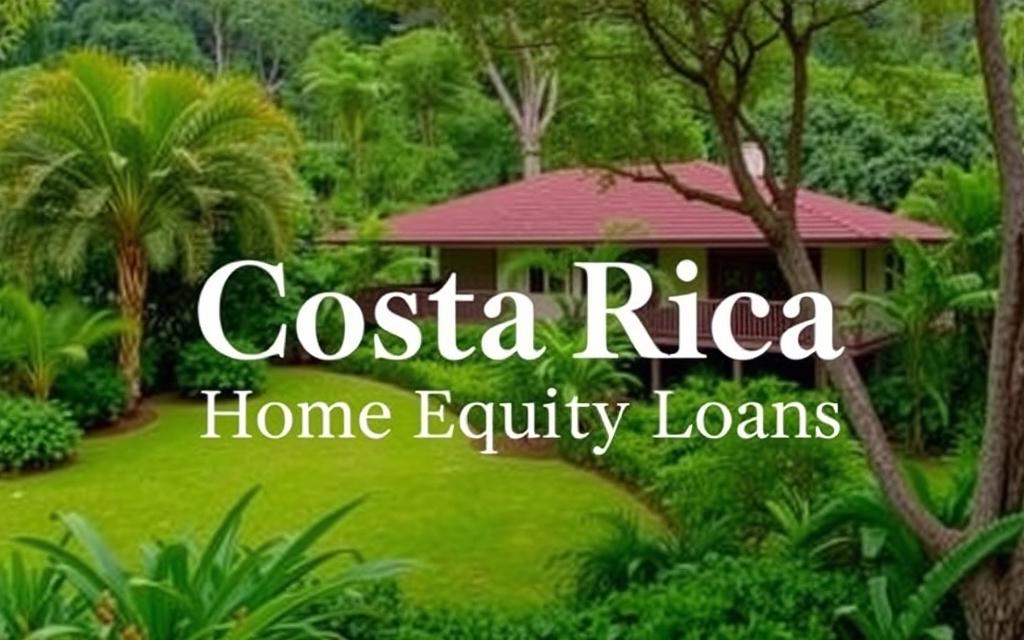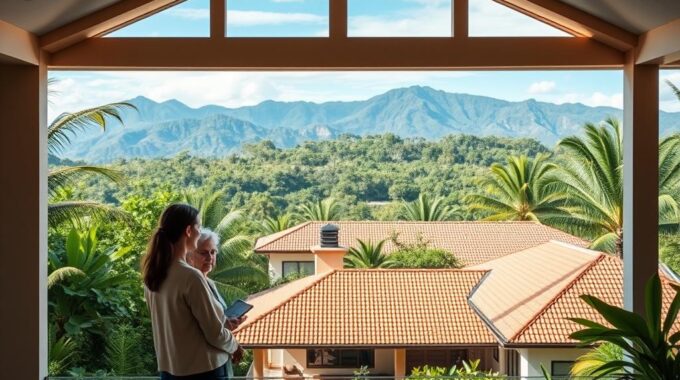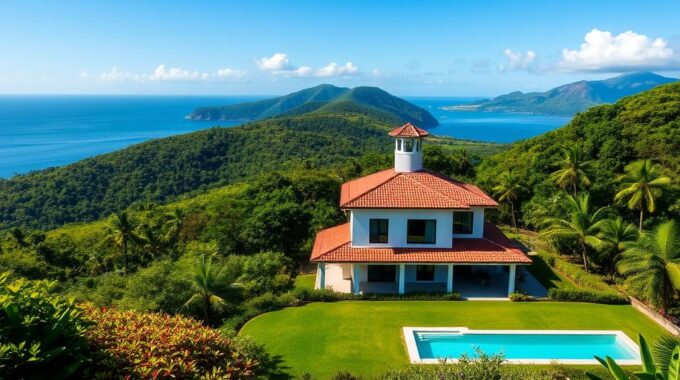Discover how to navigate understanding the approval process for GAP loans in Costa Rica. Our expert guidance ensures a smooth experience for securing investment property financing.

Buying Property in Costa Rica Without Bank Financing Options
Investing in Costa Rica real estate can be a lucrative opportunity, but the journey can be complex, especially when it comes to securing financing. For non-residents, traditional bank financing is often not a viable option.
We understand that navigating the property market in Costa Rica requires more than just a significant investment; it demands an understanding of the local real estate landscape and the available financing alternatives.
As we explore the current state of the Costa Rica property market, it becomes clear that alternative financing methods have become essential for foreign investors. This includes home equity loans and other creative financing strategies that can provide the necessary funds for investment.
The Reality of Bank Financing for Foreigners in Costa Rica
Foreign buyers often face significant hurdles when attempting to secure traditional bank financing in Costa Rica. The country’s banking system is not as accommodating to international buyers as those in other nations.
Why Traditional Bank Loans Are Difficult to Obtain
Traditional bank loans are challenging for foreigners to obtain due to stringent requirements and high interest rates. Banks in Costa Rica typically require a significant down payment and a stable income source within the country.
The High Interest Rate Environment
Interest rates in Costa Rica are notably higher than in North America and Europe. As of 2024, most banks charge between 8-10% interest in US dollars, with rates adjusting annually based on the New York prime rate plus additional percentage points.
The combination of high interest rates and substantial fees makes traditional bank financing costly. Closing costs can reach up to 3% of the loan amount, adding to the overall expense.
Understanding the Costa Rican Real Estate Market
As a haven for foreign investment, Costa Rica’s property market stands out for its resilience and consistent appreciation. The country’s real estate market is characterized by its stability, which is a significant draw for investors seeking long-term value preservation and growth potential.
Costa Rica’s real estate market demonstrates remarkable stability compared to many other countries, with property values maintaining strength even during global economic downturns. This stability is partly attributed to the prevalence of cash purchases, resulting in financially secure property owners who aren’t vulnerable to foreclosure during economic challenges.
Current Market Trends for Foreign Buyers
The current market trends in Costa Rica indicate a steady demand for properties, particularly in popular areas like Guanacaste, the Central Valley, and the Central Pacific coast. These regions have shown consistent appreciation in property values over time, making them attractive to foreign buyers.
Foreign investors are drawn to Costa Rica’s property market due to its favorable climate, diverse landscapes, and welcoming environment. The country’s conservative lending practices and history of financial stability further enhance its appeal.
Property Value Stability in Costa Rica
Costa Rica’s property value stability is a significant advantage for investors. The conservative lending practices of Costa Rican banks have contributed to the country’s financial stability, with no bank having ever failed in Costa Rica’s history. This stability, combined with the prevalence of cash purchases, ensures that property owners are financially secure and less likely to default on loans.
As a result, property values in Costa Rica have remained relatively stable, even during times of economic uncertainty. This makes Costa Rica an attractive destination for investors seeking a safe and reliable investment opportunity.
Legal Rights for Foreign Property Owners
When buying property in Costa Rica, foreign buyers need to understand their legal rights as property owners. Costa Rica is known for its welcoming attitude towards foreign investment, and the country’s laws reflect this openness.
Equal Ownership Rights for Non-Citizens
Foreigners enjoy the same property rights as Costa Rican citizens, with some exceptions. This equality under the law provides a level of comfort and security for international buyers. We will explore the specifics of these rights and how they impact property ownership in Costa Rica.
- Foreigners can own property outright, just like Costa Rican citizens.
- No restrictions exist on the type of property that can be owned by foreigners, with certain exceptions in maritime zones.
Maritime Zone Restrictions to Consider
While foreigners have broad property rights, there are specific restrictions to be aware of, particularly in maritime zones. Properties within 200 meters of the high-tide line are regulated under maritime law.

- The first 50 meters from the high-tide mark are public land and cannot be privately owned.
- The next 150 meters constitute the restricted zone, where foreigners can obtain rights through concessions.
- To hold concession rights, foreigners typically need to establish a Costa Rican corporation with at least 51% local ownership.
Types of Properties Available in Costa Rica
The variety of properties available in Costa Rica caters to different tastes and preferences, offering something for every kind of buyer.
Beachfront and Ocean-View Properties
Costa Rica’s coastline offers stunning beachfront and ocean-view properties. These properties range from modern condos to luxury villas, providing direct access to beaches and breathtaking views of the Pacific Ocean or Caribbean Sea.
Mountain and Jungle Estates
For those seeking a more secluded, natural experience, Costa Rica’s mountain and jungle estates are ideal. These properties often feature private reserves, hiking trails, and scenic views, perfect for nature lovers and those looking for privacy.
Urban and Suburban Homes
In urban and suburban areas, particularly around San José, you’ll find modern condos, gated communities, and single-family homes. These locations offer proximity to amenities like shopping centers, hospitals, and schools, making them suitable for families and professionals. Some key features of these homes include:
- Modern housing options with contemporary amenities.
- Concentrated in and around San José, Heredia, and Escazú.
- Convenient access to international schools and healthcare facilities.
- Many developments feature security and community amenities.
These properties in Costa Rica’s urban and suburban areas provide a convenient and comfortable lifestyle, blending the benefits of city living with the country’s renowned quality of life.
Costa Rica Home Equity Loans: A Viable Alternative

When it comes to financing property in Costa Rica, home equity loans offer a streamlined alternative to traditional bank loans. This financing option is particularly beneficial for foreign buyers who often face challenges when attempting to secure a mortgage through local banks.
How Home Equity Loans Work in Costa Rica
Home equity loans in Costa Rica allow property owners to leverage the equity in their existing properties to secure financing for new investments. This process involves using the property as collateral, providing lenders with a secure form of repayment. The application process is typically more straightforward than traditional bank financing, with less emphasis on paperwork and more focus on the value of the property being used as collateral.
Benefits Over Traditional Bank Financing
Home equity loans offer several advantages, including faster approval times, reduced fees, and more flexible terms compared to traditional bank financing. For instance, while interest rates may be comparable, the overall cost is often lower due to reduced closing costs. Additionally, home equity loans provide access to financing for foreign buyers who may not meet the stringent requirements of Costa Rican banks.
Our goal is to simplify the financing process, helping hardworking individuals secure the necessary funds to achieve their investment property goals without unnecessary hurdles. By leveraging home equity, investors can tap into a more accessible and efficient financing solution.
GAP Equity Loans: Using Your Property as Collateral
For those looking to finance their Costa Rican property, GAP Equity Loans provide an alternative solution. By using your property as collateral, you can access capital for various needs.
Loan Terms and Amounts Available
GAP Equity Loans in Costa Rica offer flexible loan terms and amounts. The loan-to-value ratio (LTV) is a primary determinant of the loan amount. Typically, lenders offer loans with LTV ratios ranging from 50% to 70% of the property’s value.
Interest Rates and Qualification Process
Interest rates for GAP Equity Loans in Costa Rica typically start at 12% and may increase based on several factors, including the LTV ratio. The qualification process focuses primarily on the property’s value, condition, and location rather than the borrower’s personal financial history or residency status. You can find more information on GAP Equity Loan rates in Costa.
The streamlined application process typically includes a property appraisal, title verification, and basic borrower information, with decisions often provided much faster than traditional bank financing.
Buying Property in Costa Rica Without Bank Financing
In Costa Rica, foreign buyers are discovering that alternative financing methods can be a viable solution for purchasing property without relying on traditional bank financing. This approach not only simplifies the buying process but also opens up new opportunities for investment in the Costa Rican real estate market.
The Advantages of Alternative Financing
Alternative financing options offer several benefits for foreign buyers. For instance, private lenders in Costa Rica often make decisions based on the property’s value and potential rather than rigid banking criteria, resulting in higher approval rates for foreign buyers. Additionally, working with private investors and lenders can provide access to competitive rates and terms that might not be available through traditional banks.
Some of the key advantages include:
- Higher approval rates for foreign buyers due to less stringent criteria
- Competitive rates and flexible terms tailored to the buyer’s needs
- A faster lending process that allows buyers to secure properties quickly
Connecting with Private Investors and Lenders
At our organization, we specialize in connecting property buyers in Costa Rica with a network of vetted private investors and lenders who understand the local real estate market. Our established relationships with these financing sources enable us to match borrowers with the most appropriate lenders based on their specific property type, location, and financing needs.
For more information on long-term hard money loans in Costa Rica, you can visit our dedicated page to explore your financing options.

Owner Financing Options in Costa Rica
Owner financing is a viable alternative for those looking to purchase property in Costa Rica without traditional bank financing. This method allows buyers to negotiate directly with the seller, often resulting in more flexible terms.
How Seller Financing Works
In a typical seller financing arrangement, the buyer makes a down payment, and the remaining balance is amortized over a set period. For instance, a buyer might purchase a $400,000 property with a 50% down payment, amortizing the remaining $200,000 over 20 years at 5% interest, with a balloon payment due in 2 years.
Negotiating Terms with Property Sellers
When negotiating seller financing in Costa Rica, buyers typically start by offering a substantial down payment to reduce the seller’s risk. Interest rates are negotiable, generally ranging from 5-8%. Term structures often include longer amortization periods with balloon payments, giving buyers time to arrange permanent financing or liquidate other assets.
- Buyers offer a substantial down payment (often 30-50% of the purchase price) to demonstrate financial commitment.
- Interest rates range from 5-8%, significantly lower than private lender rates.
- Term structures include amortization over 15-20 years with balloon payments due after 2-5 years.
Developer and Builder Financing

When purchasing property in Costa Rica, exploring developer financing options can be beneficial. Developer financing allows buyers to work directly with the property developer to secure financing for their purchase.
Finding Developers Who Offer Financing
To find developers who offer financing, potential buyers can research online, consult with real estate agents, or attend property expos in Costa Rica. It’s essential to verify the developer’s reputation and financial stability before entering into any agreement.
Due Diligence When Using Developer Financing
When considering developer financing in Costa Rica, thorough due diligence is essential. Buyers should verify the developer’s financial stability, track record of completed projects, and reputation among previous buyers.
Key considerations include:
- Verifying the developer’s financial stability and reputation.
- Reviewing all financing terms carefully, including interest rates and payment schedules.
- Ensuring the developer has a clear title to the land and the necessary permits.
- Protecting payments through proper escrow arrangements or construction progress verification.
We strongly recommend working with an independent real estate agent and attorney to ensure your interests are properly represented. This helps in navigating the complexities of developer financing in Costa Rica and ensures a smooth transaction.
Creative Financing Strategies for Foreign Buyers
Creative financing strategies can provide foreign buyers with alternative options for purchasing property in Costa Rica. We will explore some of these innovative approaches that can help facilitate a smooth transaction.
Using Self-Directed IRAs to Purchase Property
One creative financing strategy involves using self-directed Individual Retirement Accounts (IRAs) to purchase property in Costa Rica. This approach allows buyers to leverage their retirement funds for real estate investments, potentially enjoying tax benefits while diversifying their portfolios.
Leveraging Equity Lines of Credit from Your Home Country
Another viable option is to tap into the equity of a property in your home country through a Home Equity Line of Credit (HELOC). Many financial institutions offer competitive interest rates for HELOCs, making it an attractive financing solution. Additionally, portfolio-backed loans from firms like Schwab allow investors to borrow against their investment portfolios at low rates, providing the necessary funds for a Costa Rican property purchase.
These strategies enable foreign buyers to utilize their existing assets in their home countries to fund Costa Rican property purchases efficiently. By leveraging equity or investment portfolios, buyers can make cash offers, strengthening their negotiating position and simplifying the buying process.
The Property Buying Process in Costa Rica
Navigating the property buying process in Costa Rica can be complex, but understanding the steps involved can make it more manageable. We will guide you through the essential stages, from working with real estate professionals to understanding the legal requirements and costs associated with buying property in Costa Rica.
Working with Real Estate Professionals
Working with experienced real estate professionals is crucial when buying property in Costa Rica. They can provide valuable insights into the local market, help you find the right property, and guide you through the negotiation process. Ensure that you choose a reputable agent who is knowledgeable about the area you’re interested in.
Legal Requirements and Documentation
Understanding the legal requirements and necessary documentation is vital to a successful property purchase. This includes ensuring that the property title is clear, obtaining necessary permits, and registering the property in your name. It’s also essential to work with a qualified real estate attorney who can handle the legal aspects and ensure compliance with Costa Rican laws.
Closing Costs and Additional Expenses
When buying property in Costa Rica, it’s essential to budget for closing costs, which typically range between 3.5% to 4% of the property value. These costs cover legal fees, transfer taxes, and registration expenses. Additionally, consider ongoing expenses such as property taxes, which are approximately 0.25% of the registered property value annually. Other costs may include survey fees, corporation maintenance fees if applicable, and property insurance.
Common Pitfalls to Avoid When Financing Property
When financing property in Costa Rica, it’s crucial to be aware of potential pitfalls that can lead to financial loss. As we explore the common mistakes and challenges faced by buyers, we will highlight the importance of due diligence, understanding local laws, and avoiding fraudulent schemes.
Due Diligence Mistakes
One of the most significant risks buyers face is failing to conduct thorough due diligence. This process involves verifying the property’s ownership, checking for any outstanding liens, and ensuring that the property is not located in a restricted area. We recommend working with experienced professionals to guide you through this process, as outlined in our detailed guide on the due diligence process in Costa.
Understanding Mortgage Laws in Costa Rica
Costa Rica has specific laws governing mortgage agreements, and understanding these laws is vital for buyers. All official documents must be in Spanish, making it essential to work with bilingual attorneys and agents to avoid misunderstandings. We must ensure that all financing arrangements are properly documented and registered to provide legal protection.
Avoiding Fraudulent Financing Schemes
Buyers should be cautious of unofficial lenders offering unusually favorable terms without proper documentation or legal protections. We should never rely on verbal agreements or informal “handshake” deals, as they are not legally binding. It’s also crucial to verify the credentials of anyone involved in the transaction, including lenders, attorneys, and real estate professionals, to ensure they are properly licensed and have verifiable references.
Conclusion
With the right guidance and financing solutions, investing in Costa Rican property can be a straightforward process. Buying property in Costa Rica can be a rewarding and life-changing decision. We’ve explored various alternative financing options, from home equity loans to seller financing, that provide flexible pathways to property ownership.
Working with experienced professionals is essential for a successful transaction. Our goal is to simplify this process, connecting you with the right financing solutions and professional support to help you achieve your Costa Rican property dreams without unnecessary complications.
Article by Glenn Tellier (Founder of CRIE and Grupo Gap)



